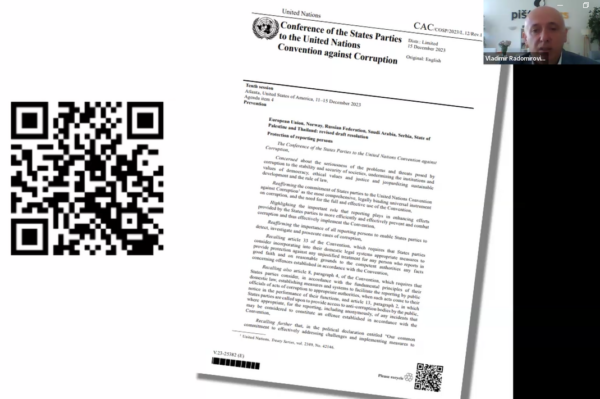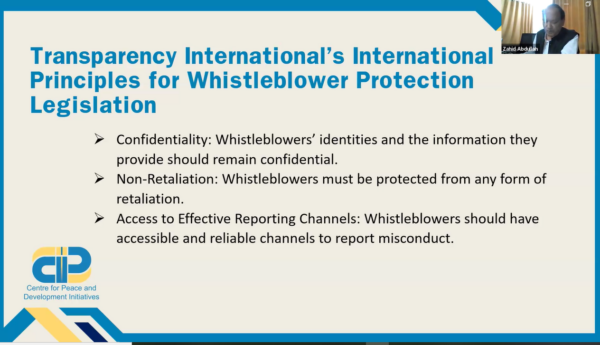5 June 2024 –
Safeguarding whistleblowers is essential for effective anti-corruption efforts, particularly in detecting offenses and implementing anti-corruption measures. Globally, over 170 nations and territories have enacted some form of whistleblower protection, with approximately 60 possessing comprehensive legal frameworks that protect rights across all employment sectors and various thematic areas. The 16th UNCAC Coalition Asia-Pacific regional meeting highlighted both the important role played by whistleblowers in the region in uncovering corruption and the risks that they face. Presentations from Vladimir Radomirović, Editor in Chief, Pištaljka (Serbia), and Zahid Abdullah, Right to Information & Inclusion Adviser, Centre for Peace and Development Initiatives (CPDI) (Pakistan), called for more robust whistleblower protection laws and discussed the development of principles for safeguarding whistleblowers.
Case Stories of Whistleblowers
Pištaljka is a Serbian CSO committed to providing legal assistance to whistleblowers, lobbying for comprehensive protection laws, and has an extensive publication record on corruption. Vladimir underscored the significance of whistleblowers in uncovering corruption, as well as the need for safeguarding for whistleblowers. To demonstrate the risks whistleblowers in the region face, he referred to several instances in the Asia-Pacific region where whistleblowers had been silenced or detained for their anti-corruption efforts, giving case examples from Bangladesh, China, and Thailand. In light of these cases, Vladimir emphasized the importance of addressing concerns that might discourage individuals from reporting as whistleblowers. Pistaljka has worked to support several whistleblowers in the past facing negative consequences for their anti-corruption efforts in Serbia, through investigative work and providing legal assistance. This allowed the whistleblowers to continue their anti-corruption efforts, and served as a message to other whistleblowers that it is worthwhile to expose corruption and other crimes occurring in the country.

Challenge vs. Motivation: CSO’s Commitment to Whistleblower Protection
Reluctance to report corruption is common, with fear of retaliation being a major deterrent. However, the most significant barrier is a deep-seated lack of trust among whistleblowers, who often believe that their reports will not lead to any action. Vladimir shared a best practice example from Pistaljka, which ensures that whistleblowers’ identities and the sources of their information remain confidential, allowing individuals to contact them anonymously via their website. Vladimir also highlighted how rather than directly using documents provided by whistleblowers to document cases of corruption, Pistaljka files freedom of information requests to obtain the necessary documents from the government to safeguard the whistleblowers. Whilst this method may be more time-consuming, it prioritizes whistleblower protection above all.
Implementing the CoSP10 Resolution: A Path Forward
The meeting also highlighted the importance of the resolution on the protection of reporting persons adopted at the 10th Conference of the State Parties to the UNCAC. Vladimir, who also led the work on the resolution as part of the Serbian delegation, commended its strong language. While the UNCAC includes provisions about protecting whistleblowers who report in good faith, the resolution emphasized the need to focus on encouraging the act of whistleblowing, rather than on the motivations behind whistleblowers reporting on acts of corruption.
Key Principles for Whistleblower Protection Legislation
Zahid from CPDI outlined key principles for effective whistleblower protection, including the need for sufficient legislation, measures for confidentiality of reporters, independence of reporting channels, legal safeguards and awareness raising.

He also highlighted the limited scope of whistleblower protection laws in countries like Pakistan, India, and Bangladesh, noting how the laws do not extend to the private sector, where there are significant issues of unethical practices.
Independent Reporting Authority for Whistleblowers
Whistleblower protection laws in the region often lack an independent reporting channel, and fail to establish oversight bodies to monitor implementation. Underscoring the importance of having an independent reporting mechanism to prevent conflicts of interest and promote good governance in the area of whistleblower protection, Zahid suggested conducting country-specific analytical studies on whistleblower protection law implementation in the region. He highlighted the necessity of engaging stakeholders to strengthen advocacy campaigns and the value of learning from each other’s approaches.
If you are a civil society activist from Asia-Pacific and would like to become involved, please contact our Regional Coordinator Fatema Afroz at fatema.afroz@uncaccoalition.org.



